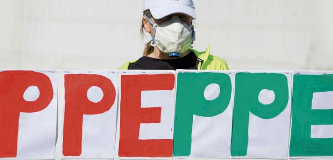
They discuss the legalities and potential claims for frontline workers not only in clinical and care settings but in places where people have been permitted, even encouraged, to congregate in numbers, such as on public transport and in food shops. The provision of personal protective equipment (PPE) and testing may be concerns. The primary issue there may be employer’s liability.
Where PPE was not available, an alternative was not to employ the worker in risky tasks. However, ‘complicated and overlapping issues’ are involved, the barristers note. For example, nurses appear to have been put under ‘enormous pressure’ to work and may have feared the consequences for patients’ as well as potential legal repercussions for themselves.
The Doughty Street barristers discuss the ‘legally complex background’ that judges will have to consider when hearing any future claim on PPE. These include the difficulty of proving causation as well as ascertaining what was ‘reasonable’ in the context of a general lack of resources. Where public authorities are involved, Human Rights Act remedies may apply.
Huckle, Brown and Powell briefly discuss the Snatch Land Rover Case, where the families of three servicemen killed by a roadside bomb successfully sued the Ministry of Defence for failing to protect them. Could medical staff argue along similar lines? The barristers say: ‘We consider that there is an arguable case that the Department of Health is in breach of Art 2 for failing to take reasonable steps to protect the doctors, nurses and other healthcare staff in the front line in the battle against COVID-19 in failing to procure and deploy appropriate PPE to protect them.’







.tmb-mov69x69.jpg?sfvrsn=16d9dd3d_1)


